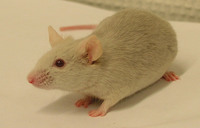
MDC and Charité Researchers Tweak the Immune System to Target Cells Bearing Tumor Antigens

This mouse possesses “high-affinity” components of the human immune system to fight cancer. (Photo and Copyright: SFB-TR 36)
The research findings of Matthias Obenaus, Professor Thomas Blankenstein (MDC and Charité), Dr. Matthias Leisegang (MDC) and Professor Wolfgang Uckert (Humboldt-Universität zu Berlin and MDC) as well as Professor Dolores Schendel (Medigene AG, Planegg/Martinsried) have now been published in Nature Biotechnology online (doi:10.1038/nbt.3147)*.
The immune system of the body is trained to distinguish between “foreign” and “self” and to recognize and destroy exogenous structures. In cancer, however, the immune system appears to be quite docile in its response.
While it is capable of detecting cancer cells because they often bear characteristics (antigens) on their surfaces that identify them as pathologically altered cells, usually the immune system does not mount an attack but rather tolerates them. The reason: The cancer cells are endogenous to the body, and immune cells do not recognize them as foreign, as they would pathogens. The researchers want to break this tolerance in order to develop therapies against cancer.
T cells are the linchpin in the attack of the immune system. On their surface they have anchor molecules (receptors) with which they recognize foreign structures, the antigens of bacteria or viruses, and thus can target and destroy invaders. Cancer researchers and immunologists are attempting to mobilize this property of the T cells in the fight against cancer. The objective is to develop T cells that specifically recognize and attack only cancer cells but spare other body cells.
Now Matthias Obenaus, Professor Blankenstein, Dr. Leisegang, Professor Uckert and Professor Schendel have developed human T cell receptors (TCRs) that have no tolerance toward human cancer antigens and specifically recognize the antigen MAGE-A1, which is present on various human tumor cells. Instead of directly using human-derived TCRs, which do not mediate substantial anti-tumor effects, the scientists took a “detour” over a mouse model.
First, the researchers transferred the genetic information for human TCRs into the mice, thus creating an entire arsenal of human TCRs (Nature Medicine, doi: 10.1038/nm.2197). When the humanized mouse T cells come into contact with human cancer cells, they perceive the tumor antigens as foreign – like viral or bacterial antigens. Thus, the T cells can specifically target, attack and destroy the tumor cells.
The researchers subsequently isolated the human T-cell receptors of these mice, which are specifically targeted toward the tumor antigen MAGE-A1. Then they transferred the T-cell receptors into human T cells, thereby training them to recognize the cancer cells as foreign.
Some people possess T cells which naturally recognize MAGE-A1 on tumor cells, but only in the Petri dish. In studies using an animal model, only the human TCRs derived from mice were shown to be effective against the tumor. The TCRs from human T cells ignored the tumor completely.
The comparison with the tweaked human TCRs from the mouse model shows that the TCRs of patients cannot recognize the tumor antigens sufficiently; they are too weak. “The fact that our TCRs from the mouse are better is a strong indication that the T cells of a human are tolerant toward MAGE-A1,” said Matthias Obenaus and Professor Blankenstein.
Using the T-cell receptors they developed, the researchers are planning an initial clinical trial with patients with MAGE-A1 positive multiple myeloma, a malignant disease of the bone marrow.
*Identification of human T-cell receptors with optimal affinity to cancer antigens using antigen-negative humanized mice
Matthias Obenaus1, Catarina Leitão1,7, Matthias Leisegang1, Xiaojing Chen1, Ioannis Gavvovidis1 Pierre van der Bruggen2,3, Wolfgang Uckert1,4, Dolores J Schendel5 & Thomas Blankenstein1,6
1Max Delbrück Center for Molecular Medicine, Berlin, Germany. 2Ludwig Institute for Cancer Research, Brussels, Belgium. 3De Duve Institute, Université Catholique de Louvain, Brussels, Belgium. 4Institute of Biology, Humboldt University, Berlin, Germany. 5Medigene AG, Planegg/Martinsried, Germany. 6Institute of Immunology, Charité Campus Buch, Berlin, Germany. 7Present address: Institute for Molecular and Cell Biology, Porto, Portugal.
Contact:
Barbara Bachtler
Press Department
Max Delbrück Center for Molecular Medicine (MDC) Berlin-Buch
in the Helmholtz Association
Robert-Rössle-Straße 10
13125 Berlin, Germany
Phone: +49 (0) 30 94 06 – 38 96
Fax: +49 (0) 30 94 06 – 38 33
e-mail: presse@mdc-berlin.de
http://www.mdc-berlin.de/de
https://www.mdc-berlin.de/34982086/en/news/archive/2010/20100806-more_cancer-fig…












